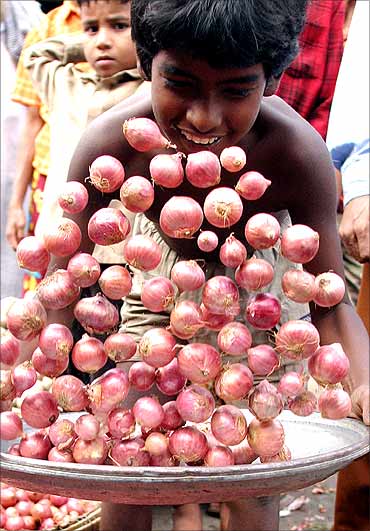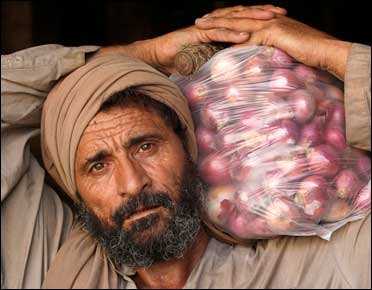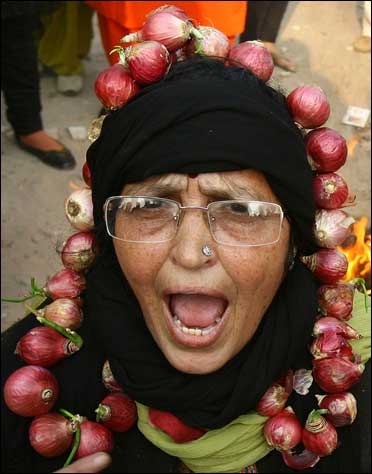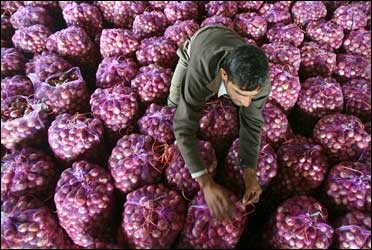 | « Back to article | Print this article |
Onion prices to rise, I-T raids continue
In a move that could further push up Onion prices, traders in Nashik and adjoining areas today went on two-day strike against tax raids and disrupted supply to contracting traders from other states who are being forced to sell the vegetable at 'below the cost price'.
"The contracting traders have said that it would be unviable to sell below Rs 30/kg as the buying cost of onion is higher than that," Nashik-based district deputy registrar Cooperative Societies Bajirao Shinde told PTI.
This has virtually halted the supply of the bulb from Nashik and Lasalgaon, Asia's biggest onion market. The retail price of onion, which is ruling at Rs 55-60/kg in metros, is expected to shoot up further in next few days in the wake of a short supply due to the strike.
Click NEXT to read on. . .
Onion prices to rise, I-T raids continue
"Onion traders in Nashik, Lasalgoan and Pimpalgoan are on strike for two days because the contracting traders from states like Delhi and Kolkata have asked them not to supply," Shinde said.
Traders are protesting on fears of losses as onion, being a perishable commodity, cannot be stored if traders from neighbouring states continue to stop buying, he said.
Shinde, who oversees the functioning of onion markets, said the contracting traders from Delhi, Orissa, Kolkata, Assam, and Bihar are are not buying becuase their state governments have asked them not to sell onion more than Rs 30/kg in the wholesale markets.
Click NEXT to read on. . .
Onion prices to rise, I-T raids continue
Currently, the wholesale price of onion in Nashik is ruling at Rs 37/kg.
At Lasalgaon, Asia's biggest onion marekt, prices were ruling over Rs 43/kg. Besides, traders are also miffed with the income tax raids conducted in some parts of the state, the official said.
Nashik and Lasalgaon region in Maharashtra supply large quantity of onions to Delhi, Kolkata, Bihar and North Eastern states.
Maharashtra is one of the largest producers of onion in the country with an average outuput of over 30 lakh (3 million) tonnes.
Onion prices to rise, I-T raids continue
The Income Tax department on Monday surveyed business premises of big onion and vegetable traders including at Azadpur wholesale market here to detect hoarding and illegal profiteering.
IT sources said the officials of the I-T department began an early morning operation of checking and obtaining the account books and ledgers of large wholesale onion traders based in Delhi and NCR.
The department's action was to crackdown on hoarding and over-valuation of onion stocks, they said.
The I-T department had last week conducted similar survey operations in Uttar Pradesh, Maharashtra and few other states. Meanwhile, traders in Maharashtra's Nashik and adjoining onion-growing areas on Monday went on two-day strike against I-T raids and disrupted supply to traders from other states who are being forced to sell the vegetable at 'below the cost price'.
Finance Minister Pranab Mukherjee had earlier said I-T raids in the premises of different traders have also helped in reducing onion prices.
There has been a 'dip in onion prices in some states after I-T search,' he had said.
The retail price of onion has started easing but still it continued to rule high at Rs 55-60/kg in metros after nationwide raids and increased supply from growing states.
Food inflation has crossed over 18 per cent for the week ended December 25 due to high rates of onion and other items.
Because of crop damage in key growing states, the country's total onion production is expected to decline by 12.5 per cent to 10.5 million tonnes this year against 12 million tonnes in 2009-10, according to research body National Horticultural Research and Development Foundation.


